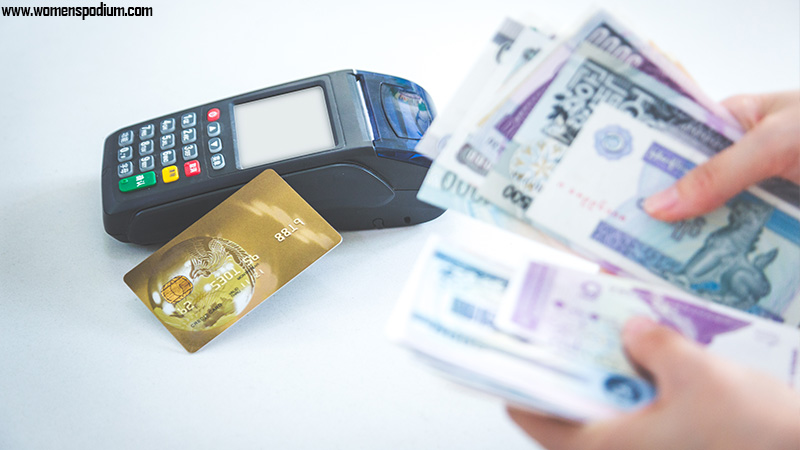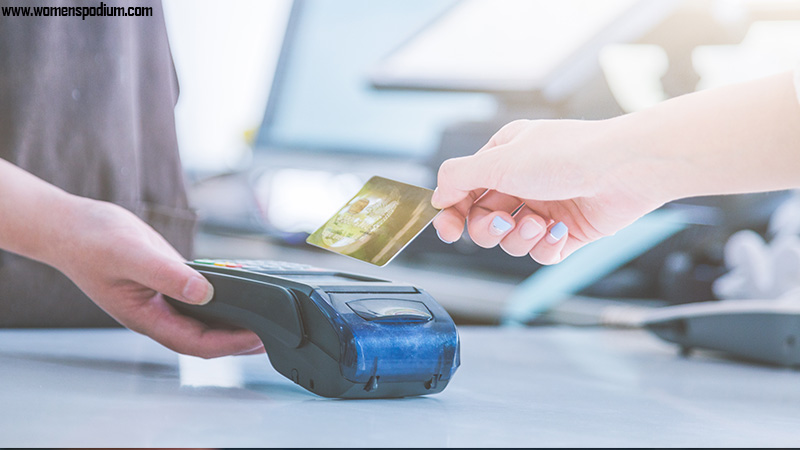
Are you one of those people who splurge and party every payday and spend the rest of the month waiting for the next paycheck? Do you seem to have trouble getting out of this loop despite trying? The culprit could be your spending habits! It’s all too easy for people to misspend their money. In fact, the majority of people are in debt due to mismanagement of their Finances. There are a lot of things to blame for this.
Firstly, the capitalist society we live in makes us think that we’re only as good as the things we own. This produces a desire in people to buy more and more things and own the latest of everything.
Secondly, credit cards enable us to buy things we cannot afford, landing a lot of people in enormous debt every year.
Thirdly, the utter lack of financial education or any sort of knowledge about how to manage money that all of us grow up with.
This results in many young people making bad decisions and hurting their financial health almost subconsciously. Luckily, in the internet world, you can find practically any kind of information at a click. So, this article is here to give you some much-needed money management tips and financial advice around your spending habits.
What are Spending Habits?

American Journal of Psychology defines a habit as a “more or less fixed way of thinking and feeling acquired through previous repetitions.” In other words, your spending habits are your actions around money that tend to occur almost subconsciously. Truly, most people might not even realize that they have bad spending habits that are draining them financially. The way you spend money, how you spend money, and where you spend it are all included in your spending habits. Consequently, we can see how important having healthy spending habits is.
Evaluate your Spending Habits for a Better Understanding of your Finances
Doing a spending habits audit is the first step to a healthy financial life. Take a moment to think back on at least three months of your past purchases. Figure out if they were essential purchases or impulsive shopping. After all, it’s one of the most fundamental good habits to have in life! Here are some prompts to get you thinking about your money habits.
1. Cash or Card? Which One do you Prefer to make Payments?

Credit cards are great and very useful to have. However, they make it extremely easy for us to buy things we cannot afford. It is quite common for people to make a big purchase and then pay it off in installments through credit cards. The problem arises when you’re making most, if not all, purchases through your credit cards. Unfortunately, people forget how much money an item costs when all they have to do is swipe a card. Eventually, this makes them fall into debt they couldn’t see coming.
On the other hand, paying with cash enables you to keep track of your Finances. Also, it makes you think twice before buying something really expensive.
2. Online or Stores? Where do you Spend the Most Money?

In today’s world, most people shop online. Especially with the whole COVID-19 pandemic and lockdown, online shopping was the only option most of us had. However, it is quite evident that shopping online leads to overspending and misspending. When we encounter cheap goods online, we tend to buy them impulsively. Moreover, most of the time, the items we buy are either not good quality or downright faulty. Rarely do we bother with returning the package since we didn’t spend any effort into purchasing it. Plus, it wasn’t that expensive anyway. As a result, we end up wasting money.
Contrastingly, when we go to a store, we can check the quality of the product ourselves. And, the effort of getting up from the couch, getting dressed, driving around, and actually walking into a shop reduces impulsive buying.
3. Overspending on Holidays and Vacations? Understand Why

Some people might observe themselves spending more money around holidays and on vacations. The reason behind this is the festive and happy mood. Consumers are more likely to make big purchases around holidays because they’re in a good mood. Similarly, if you don’t employ budget travel tips to save money on vacations, you can efficiently squander more money than you’d planned.
4. Identify Your Purchase Triggers

Undoubtedly, this is the most crucial point when it comes to auditing your spending habits. People get triggered into buying things. Understanding these triggers is really important if you truly want to improve your financial health. For example, consider the shopping ads you encounter while scrolling through social media, the seasonal and festive sales and the incentive of discount coupons. All of these are a tactic to make you spend your money. Most people mindlessly buy things they didn’t need with the money they didn’t have. Identifying what triggers you into buying stuff is the first step to better finances. Avoiding it is the second.
Reflecting on these prompts will give you a general idea about your spending habits. From here, you can identify which ones are problematic and which ones are good for you.
Top 5 Bad Spending Habits that are Damaging Your Finances
According to a study, overspending is an unhealthy practice linked with self-harm. In other words, bad spending habits, impulsive buying, habitual borrowing and gambling all come under the same category. These could be a symptom of a deeper underlying issue. Therefore, it is important to remedy it. Nowadays, there is financial therapy that people can go to in order to sort out their psychological issues around money. With that said, here are some bad money habits that you can avoid to keep your expenses in check.
1. Using Credit Card for Every Purchase

Like I said earlier, using a credit card gives you the illusion that you have more money than you actually do. This leads to unnecessary and expensive purchases. Consequently, this results in enormous credit card debt that might even make you go bankrupt. That’s why avoid using your credit card as much as you can. Buy things with cash or debit card.
2. Shopping Online out of Boredom

Many people find themselves browsing through shopping sites whenever they’re bored. That’s a huge red flag. Not only do you end up wasting money on things you don’t need, but it is also a good indication of underlying unhealthy lifestyle issues.
3. Wasting Money on Fancy Coffees Everyday

It doesn’t seem like much when you spend $5 on a coffee. But if you do it every day of the year, that’s $1825 in total. And you find that almost two thousand dollars were spent on just coffee! Not to mention that people usually have more than one cup of coffee every day, in addition to other fancy drinks.
4. Eating Out or Ordering-in Food Frequently

Another way people waste a chunk of their money without realizing it is eating out or ordering at home frequently. Noticeably, every article on Financial planning tips will tell you to avoid eating out from restaurants. Instead, cook your own food and take lunches with you to work or school. This significantly reduces the burden on your wallet. Additionally, you get a health boost because of eating homemade nutritious food.
5. Not Planning your Purchases

A quick way to get sucked into the holiday spirit and buy expensive things is not planning your purchases. It is advisable that you have a list of all the things you need or want ahead of time. Make a wish list and update it regularly. If you still want it at the end of three months, then buy it.
4 Good Spending Habits to Adopt Right Now!
Here are some excellent habits to adapt immediately to minimize your spending and have a healthier bank balance.
1. Start Budgeting to Stay Organized

This is the number one rule anyone will tell you. Start budgeting. It’s extremely easy and an excellent way to keep track of your expenditure. Regardless of your age or at what stage of life you’re in, budgeting will immediately help you. There are various budget apps available for free on the internet to help you in this endeavour too. Furthermore, you should keep your wallet, credit/debit card, as well as bank accounts organized. Doing this will give you a better perspective on your financial standing.
2. Go with the 50/30/20 Rule to Control your Expenses

Another thumb rule is the 50/30/20 Rule. According to this, 50% of your salary goes into the essential expenses. For example, bills, grocery, gas money, rents, mortgage, credit card fees, etc. 30% of your pay should be your fun or entertainment money. This includes any fashion items you want to buy, clothes, takeout food, holidays, movies, etc. And, 20% should be your savings. Do not touch this money at any cost. Even if you have to use it in an emergency, replace it next month.
3. Don’t Give in to Social Media Shopping Ads

It is ideal not to spend so much time on social media to curb your impulsive online shopping spree. Obviously, you’re less likely to shop online when you’re not being bombarded with ads about the latest product and the biggest sale, etc. The good idea is to fill your social media feeds with encouraging quotes about saving money to help further you develop good spending habits.
4. Always Compare Prices before Purchasing Stuff

This is an experienced shopper’s go-to advice. Always Compare prices whenever you have to buy something. There’s a good chance that whatever you want is available somewhere else at a much better rate.
Conclusion
Does money seemingly evaporate from your wallet? Bad spending habits could be the culprit! To conclude, subconscious spending habits can land us in debt, but they can also lead to a healthy bank balance. So, start working towards a healthier financial life with these amazing tips right away! By adopting little habits every day, you can save so much money. Subconscious spending habits can make or break our finances. Learn which bad money habits are costing you too much money and how to avoid them!
Also Read: Spending habits or shopping must be in limitation and if you are dealing with an overspending spouse or shopaholic situation, be watchful!





